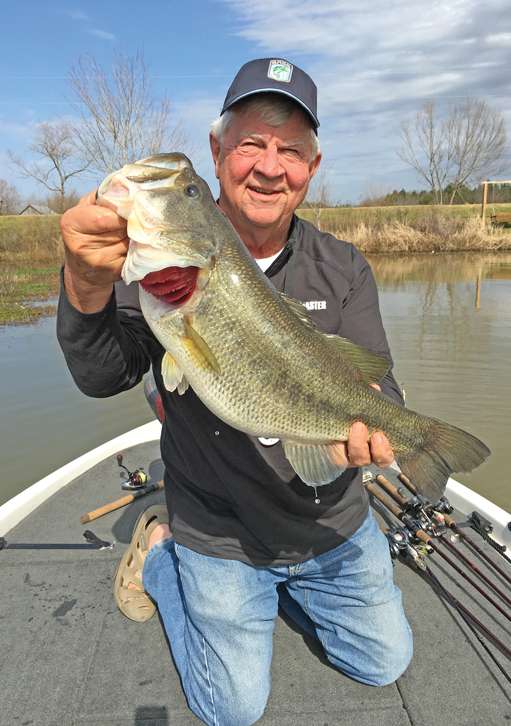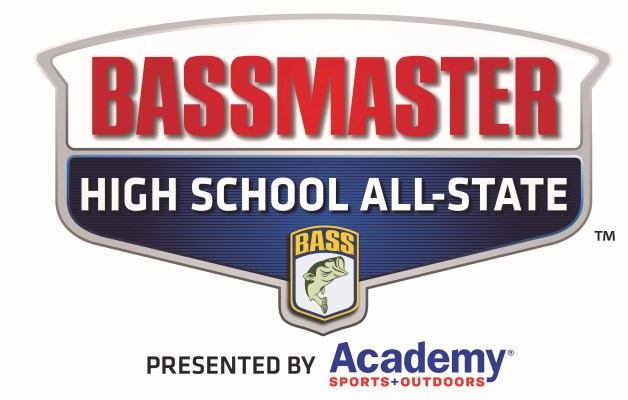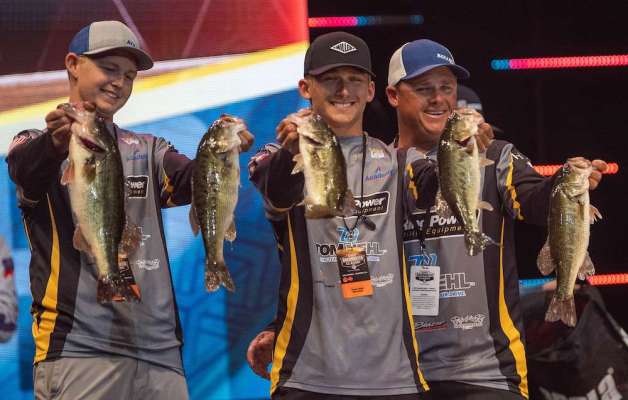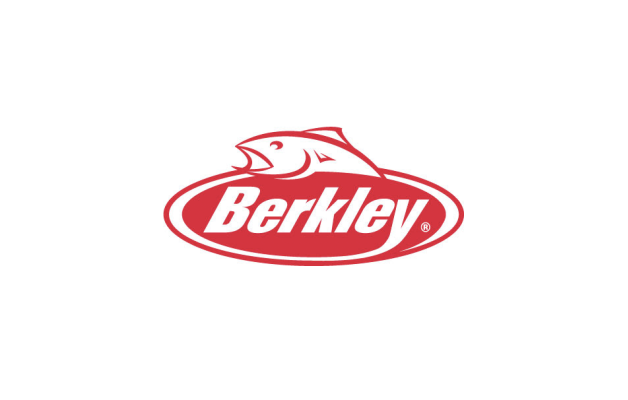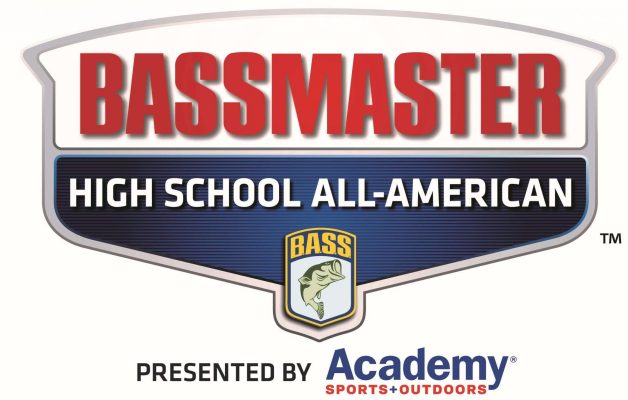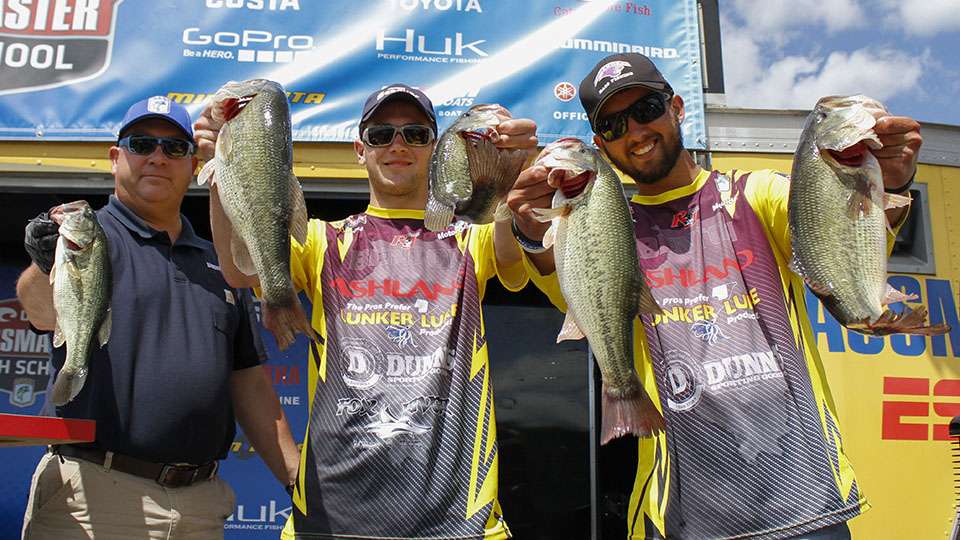
Five roads led to the recent Costa Bassmaster High School Series National Championship on Kentucky and Barkley lakes in August, and Dailus Richardson and Trevor McKinney traveled all five.
They won the Bassmaster High School Classic Championship in March, finished well inside the cut in the Bassmaster Southern Open and Bassmaster Central Open, won the Bassmaster High School Midwestern Open and were Illinois State Champions.
Even before that incredible run was complete, the two teammates from Benton High School in Illinois were named to the 2016 Bassmaster High School All-American Fishing Team — the only teammates to achieve that honor — and they finished third in the High School Championship. (Ryan Wood of Colorado, a 2015 All-American, and his teammate, Turner Mason, won the event.)
In addition to those events, in 2014 Richardson and McKinney won two Bassmaster High School qualifiers, the B.A.S.S. Nation Northern Divisional High School Championship, and the Illinois Bassmaster High School Championship, and they were runners-up in the 2014 Bassmaster High School National Championship.
I borrowed a boat and watched the young men as fished during the High School Championship on Kentucky Lake, and I could quickly see why they have been so successful. They’re competent, confident in their abilities and extremely compatible as teammates.
I chatted with them and their dads, Jeremy Richardson and Mike McKinney, as they readied their boat for the second round of competition. The comments of these very passionate, talented young anglers should provide inspiration and insights for other high school anglers.
Bassmaster — This event caps a great high school fishing career for the two of you. What’s next?
Dailus Richardson — This fall we’re going to McKendree University [in Lebanon, Ill., near their homes in Benton] on fishing scholarships. I like staying close to home.
Trevor McKinney — They have one of the topnotch fishing programs in the country. It was started about three years ago. Jon Rinderer, our coach, had the aspiration to build up the fishing team and make it one of the best. Some of the “thank-yous” they’re doing for the kids are just incredible. They travel all throughout the country, and the fishing team funds the travel as they fish the college circuits. They pay for your gas, your motels, your fishing license, your food. Pretty much Everything. You just show up, take your boat and go fish.
Bassmaster — I never thought I’d see the day when young men could go to college and have help on their tuitions through fishing. You’re very fortunate to have this opportunity.
Trevor — Yes, look at all the kids who are fishing in college. Fishing makes kids want to go to college more. I don’t know how many people I’ve talked to who said, “If there had been fishing in high school or fishing in college, I would have stayed in school.”
The things you guys at Bassmaster are doing for high school and college anglers is getting more college anglers involved. It’s really changing the game of fishing. It will be interesting to see what’s going to happen in 15 years with all these college anglers coming up.
Dailus — It’s going to be hard to make it on the Elite Series because there are so many good college anglers. This is making good fishermen even better.
Bassmaster — I take it your goal is to become a professional angler?
Dailus — Yes, I would like to go to Elite Series. But just in case I don’t, I’m studying business marketing at McKrendree so that I can still stay in the business and find a job in the fishing industry.
Trevor — I’m really going to try to be pro fisherman. One of the reasons I’m going to McKendree is to try to make it to the Classic like these guys are doing this week. [The Bassmaster College Series Classic Bracket tournament was being held on Kentucky Lake concurrently with the high school championship.] But I’m studying elementary education so I can have summers off. I’d liked to teach, and fish in the summer if it doesn’t all work out. It’s always nice to have a backup plan.
Bassmaster — How did you get started in bass fishing?
Dailus — I started fishing when I was 5 years old. My dad started a little local club tournament on local lakes on Tuesday nights, and the very first one he ever had, he and I won and got big bass. Ever since then, I’ve been hooked. He and I fished every Tuesday for years. I honestly think that what made me a good fishermen was competing against older guys and high school kids and people my dad’s age, too.
Trevor — I don’t know the exact age, but I have pictures in the house with me holding fish before I could even walk. I’ve always had a huge passion for fishing. Dad’s a really good fisherman and has won a lot of tournaments. He used to fish every chance he got, and we’d go together. Even now, every chance I get I go fishing.
Bassmaster — Trevor, you were valedictorian of your class. How did you manage to get such good grades while fishing as much as you do?
Trevor — Grades have always been the No. 1 thing. Grades are definitely more important than fishing. Wherever we went to fish tournaments, we always carried our books with us. We made sure we get our homework done and talked to our teachers about what we were missing.
That’s the thing I like about McKendree. The teachers all understand that you’re on the fishing team and you really like to fish. It’s just like kids playing basketball. The teachers understand that they have to leave for a week at a time.
Dailus — I put in lot of late night hours to do my homework. Grades come first and fishing comes afterward.
Bassmaster — Anything weird ever happen to you while you were fishing together?
Dailus — Well, Trevor got struck by lightning the other day.
Trevor — It was Tuesday of this week when I got struck by lightning. We were practicing back in Big Sandy, and we saw this storm coming with lightning in it, and we said we’d better get the heck out there. We took off running.
Dailus — We ran to the back of the pocket trying to get away from the storm. We thought the pocket was big enough for us to get away from the storm, but we got back there and it trapped us in the back of the pocket. We took cover in this boathouse with a metal dock.
Jokingly, Mike looked at me and said, “Does aluminum conduct electricity?” I said “No,” being real sarcastic. About that time I looked over at Trevor and there was a spark on him about the size of a basketball. It was full of electricity. It made a shocking sound, and he fell on the front deck.
Bassmaster — Weren’t you hurt? Did you lose consciousness?
Trevor — No, I didn’t lose consciousness. I was holding onto the dock when all of a sudden it felt like I had touched an electric fence and grabbed it. It shocked me.
Mike McKinney — We immediately left and went and got on somebody’s back porch and stayed there for 45 minutes.
Trevor — It was scary. You always hear about people running from a lightning storm and you think they’re a bunch of sissies. Then something like that happens, and it makes you realize how dangerous it actually can be. We were worrying more about the rain than anything.
Bassmaster — How many members on your team?
Dailus — It was just Trevor and me for years. Right before we graduated, four more boys went out for the team. They did pretty good in a couple of local tournaments, but they don’t have nearly as many miles in as we do.
Bassmaster — High School fishing is really growing fast, even though it takes a huge commitment sometimes.
Trevor — We’ve been very fortunate the last few years to have his dad and my dad taking us everywhere. We’ve been to Louisiana. We’ve been to Oklahoma twice. We’ve traveled the country.
Dailus — We’ve been to Louisiana twice, too.
Trevor — We couldn’t have done it without boat captains. There are so many kids who would love to fish but don’t have parents like ours to take them. We’ve traveled so many miles every weekend and spent all the money to fish. We couldn’t do it without them.
Bassmaster — When you win the Bassmaster Classic, are you going to pay them back?
Dailus — [Chuckling and looking at his dad] No, probably not.
Bassmaster — You’ve spent a lot of time fishing with your dads, and they’re really good fishermen. But you really stand out above the rest of the crowd, outfishing many other kids who also have dads who fish tournaments. What drives you to be the best? What makes the difference?
Dailus — It’s just our love for the sport. You can’t beat it. It’s the only thing like it.
Trevor — I can honestly say, a strong relationship with God has a lot to do with it. Anybody can go out there and spend five days on the water and find a school of fish, but nobody does it all the time. This year, I felt like God has really . . . I don’t know . . . it’s been almost easy. I have a really strong relationship with God and he’s favored us all year, and really our whole career.
Just like the lightning deal. That could have been bad.
Andat the Bassmaster Classic [where the pair won the high school exhibition tournament], we had a feeling all week we were going to win that tournament. It was like God was telling us . . . .
Bassmaster — How did you two come to be teammates?
Dailus — We met in sixth grade at a weekend tournament my dad hosted. We figured out that we’re both the same age and would end up in high school together even though he was from a different middle school. After that, we started fishing Tuesday nighters together and kind of learned each other’s techniques and how we fished. Then just built ourselves up as team.
We go out fishing with each other, and we’ll go out with our friends, and with our parents.
Trevor — We fish Tuesday nighters just about every week.
Dailus — And most of the time it will be one or two tournaments over the weekend. Sometimes the guys will have Thursday night tournament. We could fish four or five times a week if we really wanted to.
Bassmaster — The fact that you spend an incredible amount of time on the water must play a huge role in your success.
Trevor — That’s true. It sounds weird, but you almost have to keep in touch with the fish. Everywhere you go in the country, if you stay in tune with the fish you’ll do well. Back home at this time of year, you can go out deep and find fish on deep points and stuff like that, and it pays off when you come down here. You’ve been doing it every weekend at home, and finally you get a feel for it.
Dailus — It’s just like any other sport — you have to practice every week. If you play golf and you don’t do it but once a year, you won’t be any good at it.
Bassmaster — Your parent have invested all this money and time in you. What does that inspire you to do when you have kids?
Dailus — To do exactly the same. My dad took me out, and whenever he gets old enough, I’ll be the one taking him out. And I’ll be taking my kids out, and hopefully my kids will take their kids out. It is something that just doesn’t stop after high school or college. It’s something you can keep on returning the favor for forever and ever.
Trevor — If I have kids, I definitely will want them to experience the same things I’ve experienced with my family. I want them to see how much I care for them by taking them all over the country and spending all this money and buying all this gas to see them succeed. I wouldn’t raise them any differently than the way my dad has raised me. He’s always put me before him, and I really respect that.
Bassmaster — What effect did winning the High School All-American title have on you?
Dailus — Just about anywhere we go back in town, and in neighboring towns, if we walk in somewhere wearing a fishing jersey, people say, “Hey, I saw you on TV!”
We fished a little local club tournament one time when it was rainy and cold. We had our rain gear on and were fishing out of a johnboat, so nobody could see who we were. Then some guy with two kids yelled across the lake, “Hey, how are the Benton boys doing?” And I said, “How did this guy know who we were?”
It’s just an honor to go out and represent our community and all the people who supported us and sponsored us. I hope we are able to help them out like they helped us out.
Trevor — You notice I wore my All-American jersey when I walked out. Only 12 anglers in the country have this jersey. It’s an honor to be one of the 12. I noticed two or three kids wearing their jerseys today at the weigh-in.
It’s great what Bassmaster is doing to make high school fishermen want to be an All-Americans. We were disappointed we didn’t get it our junior year – but it has made us realize how big of an honor it really is. Once we finally did get it, it made us feel so much better.
Bassmaster — With most teams, one member is decidedly better than the other. But according to the All-American judges, you two seemed to be evenly matched.
Dailus — I’ll have my off days when he’ll have his on days, and he’ll have his off days when I’ll have my on days. We generally like to take turns. Those days when both of us are on fire, we seem to be unbeatable.
Bassmaster — [addressing the parents] You must be proud of your sons to see them achieve so much in their careers.
Jeremy Richardson — I’m proud of both of them, equally. They’ve had a great run together. They’ve been great for each other. More importantly, they couldn‘t have done what they’ve done without each other and without the support of Trevor’s dad and myself.
I wouldn’t trade a second of this for anything. It reminds me that fishing is something they can do not just in high school or college, but for the rest of their lives. They can continue on, taking out other family members, parents, grandparents and their kids until the end of time.
Bassmaster — Did you grow up fishing?
Jeremy — No. I got started when a friend at work asked me to fish a tournament with him. So the first time I really bass fished was in a tournament. I just got hooked on it, and couldn’t get enough of it after I that. It enabled me and Dailus to fish together from around the time he was about 5 or 6 years old. Wasn’t just the fishing, but it was the time we got to spend together.
And the other main thing about this is that these guys are surrounded by other boat captains, other kids and their families. The people we meet through these tournaments are almost all the best people you’d ever meet. They’d do anything for you. It’s good to be surrounded by people like that that have good values. These guys love it, and I see the enjoyment they get out of it.
Mike — My dad started taking me out ever since I was old enough to hold a rod. Like Trevor, my dad was taking me fishing before I could walk.
I got into tournament fishing through work, too. I started going into bigger tournaments and had a good bit of success. Trevor and I fished a few tournaments together beginning when he was this tall, and we had some good tournament wins.
We’ve spent so much time with Dailus that almost like one of my own. If I get aggravated at him, I yell at him just like he was Trevor. Seriously we cut up and have a good time. I’m gonna miss these boys. I’m gonna miss taking them fishing, after this year.
Jeremy — We’ve done this together. It’s been a 50-50 deal. He’s put as much time and money into it as I have, and we have worked together to get them where they needed to be. When he can’t take ’em I take ’em, and when I can’t take ’em, he takes ’em.
Mike — [In addition to the fishing] the No. 1 thing in my life has been my relationship with God. I’ve raised my kids in church and feel like it’s paid off. They have a respect for people, and they have a respect for the sport. It’s a thing we don’t have very much in this country.
Bassmaster — At B.A.S.S., we view high school and college fishing programs as ways grow the sport because they reach people at a young age. But some say it mainly caters to youngsters who are already avid about fishing. Do you believe it is reaching kids whose dads aren’t already tournament fishermen?
Mike — Trevor has a little cousin who’s 11 and is a fishing machine. He can catch ’em. And his dad doesn’t even own a fishing pole. Trevor has taken him out some, and his mom and dad have sometimes paid people to take their kid fishing, like others might pay for baseball lessons.
I see several of these kids at this motel whose dads aren’t fishermen. But they’ve gotten addicted to it. You take a kid fishing and he can’t hardly not like it.
Jeremy — Over the last six or eight years, I’ve been trying to develop a platform for kids to get started in the sport and carry on with it. I’d say that maybe only 25 percent of the kids we see out here fishing these tournaments have a parent or grandparent, aunt or uncle who takes them. Close to 75 percent of the boat captains are members of a club that provides boats to get the kids on the water.
People say, “It’s all about the youth.” Well, I’d like to see more people really get serious about it. It takes people and organizations providing boats and some funding for gas money and motel rooms for these kids to go out of town to compete. I have seen this starting to change the last four or five years, but that’s what it’s going to take to really promote the industry the way it should be.

